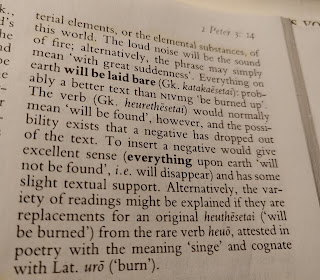
The Orthodox Study Bible: Belief
The Orthodox Study Bible, New Testament and Psalms, (1993) Saint Athanasius Orthodox Academy, Thomas Nelson Publishers, Nashville, Tennessee.
I continue from my Reformed Christian tradition to use this fine academic source for review...
Glossary: Reverend John W. Morris, Ph.D.
Belief
'The acceptance of the truths of the gospel. More than mental assent, belief as used in the NT includes trusting in God from the heart.' (794). Further, the entry states that this belief results from hearing the Word of God (Romans 10: 17) and as well the gift of the Holy Spirit (Ephesians 2: 8). (794).
The text opines that a belief in Jesus Christ without a faith in action is quote 'hollow and void of the righteousness necessary in salvation.' (794).
New Testament Greek
Romans 10:17
New King James Version (The version used by the Orthodoxy text)
17 So then faith comes by hearing, and hearing by the word of God.
Greek New Testament: Romans 10: 17 Image two
Hearing is the first instance ἀκοῆς is the sense of hearing and is noun, genitive, feminine, singular. In the second instance, ἀκοῇ is defined the same, but is noun, normative, feminine, singular. The genitive ἀκοῆς is possessive. As in one has heard. The nominative ἀκοῇ is the subject, as in those reading Romans, hearing the word of God. The faith comes by hearing, and what is heard is the word of God.
Regeneration
On this website, my Reformed perspective has biblically provided the theology of regeneration in salvation. This is God the Holy Spirit, regenerating the chosen that have heard the gospel and been enlightened, by God, to believe in and embrace the atoning and resurrection work of Jesus Christ for him/her.
Edited
John Murray (1937-1966)(1977) explains that the Holy Spirit ‘summons men into union and fellowship with his Son so that, united to him in whom all spiritual blessings are treasured, they come to possess Christ and all that belongs to him in his capacity as Saviour and Redeemer.’ Murray (1937-1966)(1977: 167).
Regeneration (Murray (1937-1966)(1977: 171) takes place which is a powerful change in the human being via the Holy Spirit (Murray (1937-1966)(1977: 171). This transforms one corrupt and in sin in opposition to God (Murray (1937-1966)(1977: 168-169). to one pleasing to God and trusting in God.
Soren Kierkegaard states that ‘sin is man’s destruction.’ Kierkegaard (1847-1848)(1955)(1966: 108). Regeneration is a new ‘vital principle, a new habit, the law of God, and a divine nature’ are framed in a human heart. Murray (1937-1966)(1977: 172).
Herman Bavinck (1918)(2006) equates the term regeneration with rebirth. In John 3, Jesus does not literally speak of one being born a second time, but literally insists one be born from above. Bavinck (1918)(2006: 46).
(See also Titus 3). Regeneration consists of a person being converted from a life of giving in to temptation to one living in relationship with God. Erickson (1994: 600). It is the communication of divine life to a soul. Thiessen (1956: 367).
Although this does not make a person divine, but rather one guided by God. At the instance of regeneration the Holy Spirit begins a new inclination within the fallen human will (Shedd (1874-1890)(1980: 136 Volume 2). The human being is given a divine inclination, not of self, as it is contrary to the his or her fallen inclination, by the Holy Spirit. Shedd (1874-1890)(1980: 136 Volume 2).
Packer views regeneration as the new birth and an inner re-creating of the fallen human nature through and by the grace of the Holy Spirit. Packer (1996: 924). I would not use the term re-create, but instead view regeneration as a process by which God begins to transform an individual to be Christ-like, as in ultimately being a sinless human being. This culminates in the resurrection. 1 Corinthians 15.
Within Reformed theology, regeneration is viewed as an initial one time act of the Holy Spirit in a person (Murray (1937-1966)(1977: 172) (Erickson (1994: 249); and a person is therefore understood to be converted and therefore able to freely believe. (Murray (1937-1966)(1977: 172).
My view is that it is indeed God’s choice alone to regenerate and therefore he alone is active in regeneration, (Murray (1937-1966)(1977: 172). I agree with Murray on this point. but simultaneously as a person is regenerated they believe in Christ. Therefore although I view God as the initiator of regeneration I reason that logically, in order to avoid any suggestion of force or coercion, as God regenerates the saved person, he or she simultaneously believes.
Compatibilism allows for limited but significant human freedom. I call this limited free will, not to be confused with incompatibilism and libertarian free will (see website archives). Kierkegaard suggests that Christianity is a religion of freedom and Christians are convinced to voluntarily give up all contrary to Christ. Kierkegaard (1847-1848)(1955)(1966: 186). The term convinced is a good one and I reason this is a work of the Holy Spirit.
There is ‘no compulsion of the will in regeneration.’ states Shedd. Shedd (1874-1890)(1980: 136-137 Volume 2).
Calvin reasons that a person is not forced or coerced to believe in the gospel. Calvin (1543)(1996: 68). I would view conversion as taking place simultaneously with regeneration in a person, although again I state that God alone via the Holy Spirit causes the regeneration process. Murray (1937-1966)(1977: 172)..
Righteousness for salvation
The Orthodox understanding does differ from the Protestant view (348). I have reviewed this in articles, admittedly non-exhaustively. Edited from previous entries.
The Orthodox Study Bible (440)
(Again paraphrased within the British academic system)
Notes: Ephesians 2: 8-10
By the unity of grace, faith, and works persons are brought into the Kingdom of God. (440-442). These are not equal, for grace is uncreated and infinite. (442). Human faith is limited and can grow, (442). Good works flow out of a true, authentic, faith. Works do not earn a person this great treasure (442).
I read this as stating that good works cannot earn a person justification and that good works cannot earn a person salvation. Salvation is a gift and those who receive it shall do good in Jesus Christ and the triune God. (442).
Direct quote:
'We are not saved by good works, but for good works.' (442).
By their own definition... Orthodoxy here (801 and image), denies works righteousness for salvation.
But my theological reasoning, by adding the concept of cooperation (to cooperate) by His grace, it denies justification by grace through faith alone. (As in 348).
This theology, from my Reformed perspective also places too much reliance on libertarian free will, as I view regeneration as taking place from God and embraced by the chosen person.
A significantly free response within moral responsibility in faith is not forced or coerced, but it is also not done in libertarian free will. Those whom God chooses, will freely believe (Ephesians 1-2, Romans 8-9), they will not reject salvation as God has regenerated and simultaneously converted the person (s) that believes by grace through faith.
Within a Reformed perspective and evangelical view (and biblical Protestantism) the imputed righteousness of Jesus Christ in justification (Romans, Galatians) is applied immediately upon salvation:
2 Corinthians 5:21 New American Standard Bible
21 He made Him who knew no sin to be sin on our behalf, so that we might become the righteousness of God in Him.
In contrast, orthodoxy views justification as 'the act whereby God forgives the sins of the believer and begins to transform him or her into a righteous person.' (801). It is noted that justification cannot be earned by works of righteousness (801). This is a gift of God (801).
This transformative aspect of atonement within my Reformed theology, at least, is viewed as sanctification in holiness.
Romans 6:22
New King James Version as example:
22 But now having been set free from sin, and having become slaves of God, you have your fruit [a] to holiness, and the end, everlasting life.. Footnotes [a] Romans 6:22 unto sanctification
The resurrection for those in Jesus Christ to eventually, physically culminate the applied atoning and sanctification work in believers (1 Corinthians 15, 1 Thessalonians 4, Revelation 20-22).
BAVINCK, HERMAN (1918)(2006) Reformed Dogmatics Volume 2: God and Creation, John Bolt (gen.ed.), Translated by John Vriend, Baker Academic, Grand Rapids.
BAVINCK, HERMAN (1918)(2006) Reformed Dogmatics Volume 3: Sin and Salvation in Christ, John Bolt (gen.ed.), Translated by John Vriend, Baker Academic, Grand Rapids.
CALVIN, JOHN (1539)(1998) The Institutes of the Christian Religion, Book II, Translated by Henry Beveridge, Grand Rapids, The Christian Classic Ethereal Library, Wheaton College.
CALVIN, JOHN (1539)(1998) The Institutes of the Christian Religion, Book IV, Translated by Henry Beveridge, Grand Rapids, The Christian Classic Ethereal Library, Wheaton College.
CALVIN, JOHN (1543)(1996) The Bondage and Liberation of the Will, Translated by G.I. Davies, Grand Rapids, Baker Book House.
ERICKSON, MILLARD (1994) Christian Theology, Grand Rapids, Baker Book House.
KIERKEGAARD, SOREN (1847-1848)(1955)(1966) On Authority and Revelation, Translated by Walter Lowrie, New York, Harper and Row, Publishers, Incorporated.
KIERKEGAARD, SOREN (1848-1849)(1961) Christian Discourses & The Lilies of the Field and The Birds of the Air & Three Discourses at The Communion on Fridays, Translated by Walter Lowrie, New York, Oxford University Press.
MURRAY, JOHN (1937-1966)(1977) Collected Writings of John Murray, Vol. 2: Select Lectures in Systematic Theology, Edinburgh, The Banner of Truth Trust.
PACKER, J.I. (1996) ‘Regeneration’ in Walter A. Elwell (ed.), Evangelical Dictionary of Theology, Grand Rapids, Baker Books.
SHEDD, WILLIAM G.T. (1874-1890)(1980) Dogmatic Theology, Volume 1, Nashville, Thomas Nelson Publishers.
SHEDD, WILLIAM G.T. (1874-1890)(1980) Dogmatic Theology, Volume 2, Nashville, Thomas Nelson Publishers.
The Orthodox Study Bible, New Testament and Psalms, (1993) Saint Athanasius Orthodox Academy, Thomas Nelson Publishers, Nashville, Tennessee.
THIESSEN, HENRY C. (1956) Introductory Lectures in Systematic Theology, Grand Rapids, Wm. B. Eerdmans Publishing Company.




































